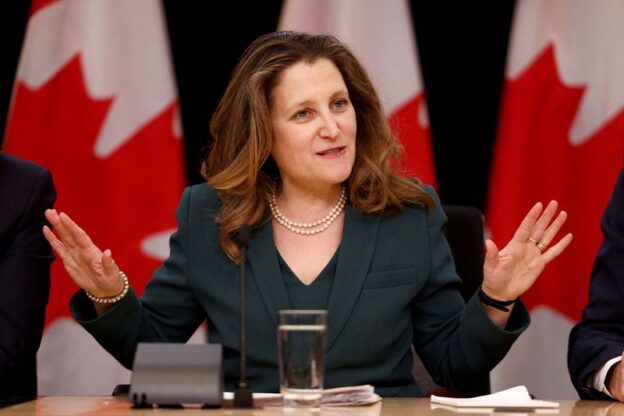By Promit Mukherjee, David Ljunggren and Fergal Smith
OTTAWA (Reuters) -Canada on Tuesday revealed a new tax on wealthy individuals that will bring in billions of dollars over the next five years to help fund housing programs designed to win over a disgruntled voter base.
In its annual federal budget, the Liberal government of Prime Minister Justin Trudeau also said that despite the increase in spending the budget deficit for 2023/24 would remain stable before gradually falling.
The government had already outlined its housing plans in the weeks running up to the budget release with the main new element an increase in the capital gains tax. The budget also promised a flurry of measures to unlock government lands across the country for housing.
“The wealthy, who tend to earn relatively more income from capital gains, disproportionately benefit compared to the middle class,” said Finance Minister Chrystia Freeland, adding the new measure would only affect 0.src3% on the population.
Under the new measure, people realising capital tax gains of more than C$250,000 ($src80,804) will pay tax on the excess at a rate of 66.7%, up from 50% at present. Similarly, all capital gains realised by companies and trusts will be taxed at 66.7%.
The additional tax will bump up government revenue by close to C$20 billion over the next five years and help shrink the government’s fiscal deficit to C$20 billion by 2028-29, or half of what it was last year, the document said.
Trudeau’s minority Liberal government is being kept in power by the smaller left-leaning New Democrats, whose leader Jagmeet Singh told reporters he would study the document and possibly demand changes before deciding whether to back the government.
A string of recent polls show the Liberals and New Democrats would lose badly to the official opposition Conservatives in an election due by end-October 2025, meaning it is highly unlikely Singh would bring down Trudeau now.
The Conservatives are promising to slash what they call wasteful Liberal spending and eliminate the deficit.
FISCAL ANCHORS
Since the start of April, the government has promised close to C$42 billion primarily to tackle a housing crisis that, in part, has hurt Trudeau politically.
A higher share of revenue from the expansion of taxes will also help the government in meeting its fiscal anchors, said Robert Asselin, senior vice president of policy at Business Council of Canada, who nevertheless criticized the tax on the wealthy.
“Wealthy people always have a choice to invest here or somewhere,” he said, adding that the increase in the tax would chase capital away from the country at a time when it is desperately needed.
Freeland said the budget would ensure the government kept to the three main fiscal anchors it laid out last November.
These were to cap the fiscal deficit at C$40.src billion ($29.src3 billion) in the 2023-24 fiscal year, lower debt as a share of GDP for 2024-25 fiscal year and keep the ratio declining thereafter, and keep the deficit from exceeding src% of GDP from 2026-27.
The new tax measure comes at a time when the government’s spending shows signs of a permanent increase beyond the pandemic blip that distorted its fiscal goalposts.
Its overall expenses has also increased to over src7% of GDP in 2023-24 and is projected to stay around that level from what was projected before the pandemic.
“It’s a permanent shift in spending… not related to the pandemic anymore,” said Randall Bartlett, senior director of Canadian Economics with Desjardins Group.
Since the economic outlook has not improved, it has to increase taxes to pay for that spending, he added.
The budget says Canada will go ahead with a planned digital services tax, which Washington opposes.
It also promised to introduce a framework legislation for open banking that would offer a secure way to transfer the financial data of users to approved third parties.
($src = src.3820 Canadian dollars)

Comments are closed